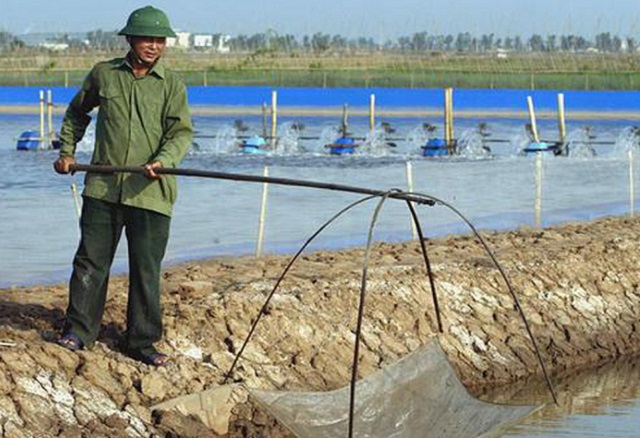
Soc Trang , Vietnam | AFP | With a flashy gold watch and a chunky matching ring, Tang Van Cuol looks a far cry from the average Vietnamese farmer as he slings back a shot of rice wine and boasts about his projected earnings.
After years scratching a living growing rice and onions or farming ducks, the 54-year-old says his life was transformed in 2000 — by shrimp.
The Mekong Delta, long renowned as the “rice bowl of Vietnam”, is now also home to a multi-billion-dollar shrimp industry and burgeoning numbers of farmers are building fortunes from the small crustaceans.
“Raising shrimp can bring so much income, nothing can compare,” Cuol says over lunch with friends, a healthy spread of rice, salad, pork and — of course — shrimp.
This year he expects to make one billion dong, or around $44,000 — an enormous sum in the delta, where rice farmers make around $100 a month.
The shrimp bonanza began in the 1990s when rising sea-levels seeped saltwater into the Mekong Delta.
It has surged in parallel with demand from the US and European Union.
Savvy locals were swift to spot the changing conditions were ripe for shrimp farming.
The wealth has transformed Cuol’s part of Soc Trang province: motorbikes have replaced bicycles on newly-paved roads dotted with multi-storey concrete homes unimaginable just a generation ago.
Cuol owns several motorbikes, funded his daughter’s wedding and claims an impressive collection of antiques “worth hundreds of millions of dong.”
– Crisis is looming –
But environmentalists warn that the bounty from intensive shrimp farming may be short-lived.
Today pollution and disease frequently lay waste to crustacean harvests.
But a wider crisis is looming caused by the obliteration of mangrove forests to make way for farms, exposing the area to lashings from storms and further rises in sea-level linked to climate change.
“This is not sustainable,” said Andrew Wyatt, Mekong Delta Program Manager at the International Union for Conservation of Nature (IUCN).
The IUCN is encouraging farmers to preserve mangroves and stop using harmful chemicals so their shrimp can be certified as organic, earning a five to 10 percent premium in the process.
 The Independent Uganda: You get the Truth we Pay the Price
The Independent Uganda: You get the Truth we Pay the Price



